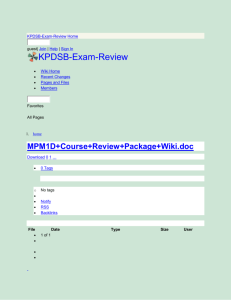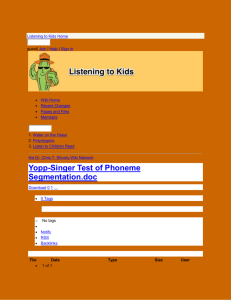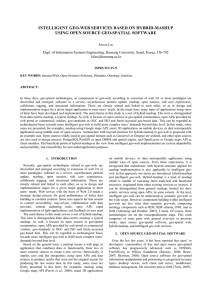lecture1 - cct205w07
advertisement
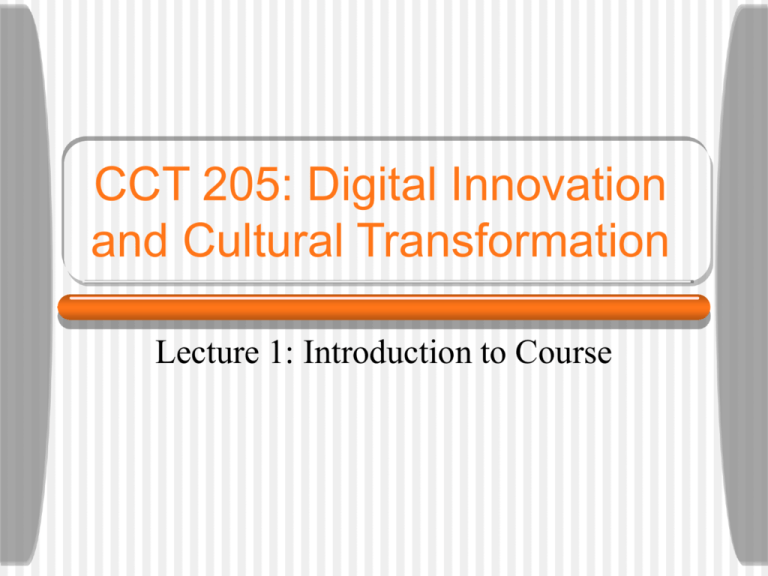
CCT 205: Digital Innovation and Cultural Transformation Lecture 1: Introduction to Course Welcome! • A bit about me • A bit about you: in pairs, answer the following: • a) List three things the Internet allows you to do that you couldn’t do ten years ago. • b) What do you think the Internet will look like in 2010? Course Structure • • • • • • Wiki Assignment Concept Mashup Learning Object Learning Journals Final Test A Note on Labs Wiki Assignment • • • • Wikispaces vs. WebCT Vista - why? Use of wikis in CCIT started here last year http://cct205w07.wikispaces.com Instructions on use Wiki Assignment • Concept definition already done (see next assignment) • Feedback on projects - using wiki to provide feedback on other student works • Community building - things that qualify (and things that don’t) • Analysis and reflection - a roadmap to contributions Concept Mashup • What’s a mashup, anyway? • Concept definition from last year’s 205 (some good, some less so…) • In groups of 2-3, you’ll be given randomly assigned topics (minimum 3) • Goal: create new content based on topic and their outlines, integrating at least two into a new idea • Interim deadline and feedback loop Learning Object • What is a learning object, anyway? • In groups (potentially the same if they work out, but free to change) take a different concept mashup (one you did not work on) and create an interactive learning object using Flash • Interim deadline and feedback • Flash experience not required - labs will teach basic skills • Creativity is required - learning object should be something that future 205 students (and others) would find useful, engaging and instructive Learning Journals • Reflection on lecture material • Guest speakers will be integrated into course structure - definitely will be reflection questions on those • A few others (including next week) • 5 questions of a choice of 7 • Due near end of class, but probably best to write as you go Test • One test, last lecture period • Will test understanding and application vs. simple regurgitation of information • Example of style of questions will be posted in advance • Lecture notes and guest speaker notes as study guide • In the event readings are bumped to accommodate new speakers, they won’t be tested. Labs • Opportunity for group work on course projects • Technical assistance on issues, esp. wiki and Flash • Show up to your own labs! • No lab today - but you might want to sign up for the wiki, check out the old wiki, etc. in the meantime Policy Notes • Academic dishonesty is a serious matter. • Assignments designed to make it difficult which makes the commission of it rather obvious and easy to catch. • So don’t. It’s stupid, both in academe and business (here, you’ll only fail - there, you’ll get fired or worse.) Citation Notes • Referencing sources is very important (and done very poorly these days…) • All citation standards a) cite information clearly retrieved from an outside source; b) do it in context; c) make it easy for the reader to find the source. • Particular style is arbitrary - but learn one and master it. • Bad citation will be penalized this year. There’s no excuse. Professional Etiquette • What does it mean to treat people professionally? To have others treat you professionally? • Code of conduct ideas Accessibility and Due Dates • Chronic but manageable learning challenges are accommodated, but can and should be documented early • Due dates - flexibility is easier to grant with foreshadowing of problem. If you’re going to be late, you’ll know that well before you actually are. • Post-facto and undocumented excuses aren’t all that effective - take ownership of the situation early Next Week • Blogs, wikis and You • Time article - Google it (URL was too large - will be posted on wiki as well though.) • First labs - group dynamics and early group formation, perhaps assignment of topics (either then or the week following…)
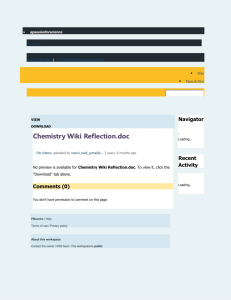
![ClaytonMA - Logo and Branding Project[1]](http://s3.studylib.net/store/data/008462866_1-9d5bad65bbcf3383d9d9e8513859b814-300x300.png)
